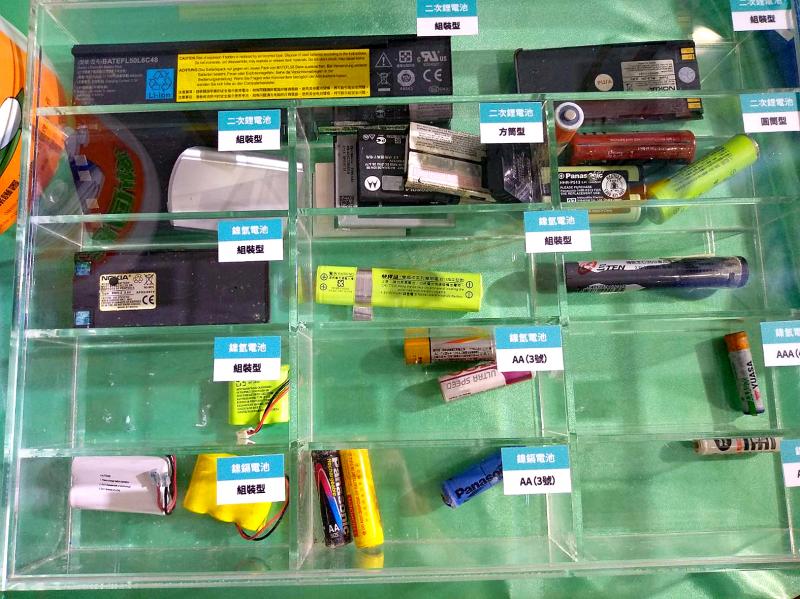Where should you take used dry batteries for recycling? The Environmental Protection Administration (EPA) is launching a recycling campaign during which customers shopping at 7-Eleven, FamilyMart and TSC Million convenience stores or Far Eastern A.Mart superstores will get a discount when they take in used batteries to recycle. Every 0.5kg of used batteries will be rewarded by an NT$11 discount at the checkout. The program will run at more than 10,000 stores across Taiwan from Sept. 8 to 21.
Waste dry batteries contain heavy metals such as iron, manganese and zinc. If disposed of arbitrarily, they will pollute the environment, but if they are properly recycled, they can be reused in industrial processes.
Hsieh Ping-hui, executive secretary of the EPA’s Recycling Fund Management Board (RFMB), says that about 11,000 tonnes of dry batteries are used each year in Taiwan, but only about 4,000 tonnes of them are recycled. This puts the recycling rate at about 40 percent, which still leaves room for improvement.

Photo: Liu Li-jen, Liberty Times 照片:自由時報記者劉力仁
RFMB deputy executive secretary Wei Wen-yi says that many people do not know where to take batteries for recycling. She says that “batteries can be recycled wherever they are bought.” For example, there are recycling services available in convenience stores, supermarkets and superstores. Cleaning squads’ recycling trucks and local communities’ recycling stations also provide regular service in recycling waste dry batteries, as do chain drugstores that sell dry batteries, wireless communication equipment stores, telecommunications equipment stores and photographic equipment stores.
Wei also reminds the public that when batteries can no longer power high-power electric appliances, they are not completely dead or unusable. In fact, they still work at “reduced level” in low-power devices such as alarm clocks and remote controls before their electricity completely runs out.
(Translated by Lin Lee-kai, Taipei Times)
用過的乾電池要去哪回收?環保署推出廢乾電池加碼回收活動,九月八日至二十一日,到統一超商、全家便利商店、台糖蜜鄰超市、愛買量販店全國一萬多個據點,每零點五公斤廢乾電池可折抵當次消費十一元。
廢乾電池含有重金屬鐵、錳、鋅等,若任意棄置,會污染環境,但如果妥善回收,可回到產業製程循環再利用。
環保署資源回收管理基金管理委員會執行秘書謝炳輝指出,我國每年約使用一萬一千公噸乾電池,但獲得回收僅約四千公噸,回收率維持在四成左右,仍有進步空間。
回收基管會副執秘魏文宜表示,許多民眾不知道電池要拿去哪裡回收,她強調「哪裡買電池,哪裡就可以回收」,例如便利商店、超市或量販店都有回收服務;另外如清潔隊資源回收車、村里資源回收站,以及販售乾電池的連鎖藥妝店、無線通訊器材行、各電信門市及攝影器材行等販售點,也都有常態協助回收廢乾電池。
她也提醒民眾,電池在高耗電電器用品中無法使用時,並非真的沒電可用了,其實還可先「降階使用」,將電池換到鬧鐘、遙控器等低耗電產品繼續使用。
(自由時報記者羅綺)

A: When is the Lantern Festival? B: The festival is celebrated on the 15th day of the first month of the lunar calendar, which fell on Feb. 12 this year. A: Oh no! Did I miss the 2025 Taipei Lantern Festival? B: Yes, you did. But you can still go to the 2025 Taiwan Lantern Festival in Taoyuan, which will run until this Sunday. A: Let’s go admire the exuberant lanterns. A: 元宵節到底是哪一天? B: 就是農曆1月15日啊,今年則落在國曆2月12日。 A: 喔不,我是不是錯過了2025台北燈節? B: 是的,但你還可以去桃園的2025台灣燈會,活動將持續至週日。 A: 那我們去欣賞豐富的花燈秀吧! (By Eddy Chang, Taipei Times/台北時報張聖恩)

A: What’s the theme of the 2025 Taiwan Lantern Festival’s main lantern? B: The theme is “Paradise,” and the main lantern is a snake-shaped “infinity” symbol that features a lighting show every half an hour. A: Cool, I heard that there are over 300 lanterns. B: There are even giant lanterns in the shape of Pikachu and some other popular Pokemon characters. A: Let’s go now. A: 2025台灣燈會主燈的主題是什麼? B: 主題是「無限樂園」!主燈的造型則是蛇形的數學「無限號」,主燈每半小時還有一次燈光秀。 A: 酷喔,聽說總共有300多件花燈作品。 B: 甚至還有皮卡丘和其他熱門寶可夢角色的巨型花燈呢。 A: 哇我們現在就出發吧! (By Eddy Chang, Taipei Times/台北時報張聖恩)

本文由生成式AI協作,本刊編輯編修。 Tucked away in southwestern Taiwan, Yunlin County is a treasure trove of cultural heritage, rich history, and natural beauty. From its stunning temples and glove puppetry to historical architecture and picturesque landscapes, Yunlin rewards those who venture off the beaten path. Yunlin is renowned for its flourishing temple culture. Temples in this region are not merely places of worship but also communal centers where people gather for festivals, rituals, and social functions. One of the most notable temples here is the Beigang Chaotian Temple, which was built more than 300 years ago and is dedicated to Matsu, the sea

Nestled within the heart of Taipei, National Taiwan University (NTU) contains a grand and spacious sanctuary where nature and academia come together in perfect accord. Across its expansive 111-hectare campus, NTU reveals a landscape rich with history, lush greenery, and a thoughtfully preserved ecosystem. This tranquil haven invites visitors to take their time wandering among the elegant buildings, to admire the rare plants, and to experience a space that exudes quiet inspiration. Zhoushan Road: A Gentle Prelude to NTU’s Tranquility Beginning at Gongguan MRT Station, the enchanting avenue Zhoushan Road leads visitors into NTU shaded by golden rain trees, cottonwoods, and Javanese